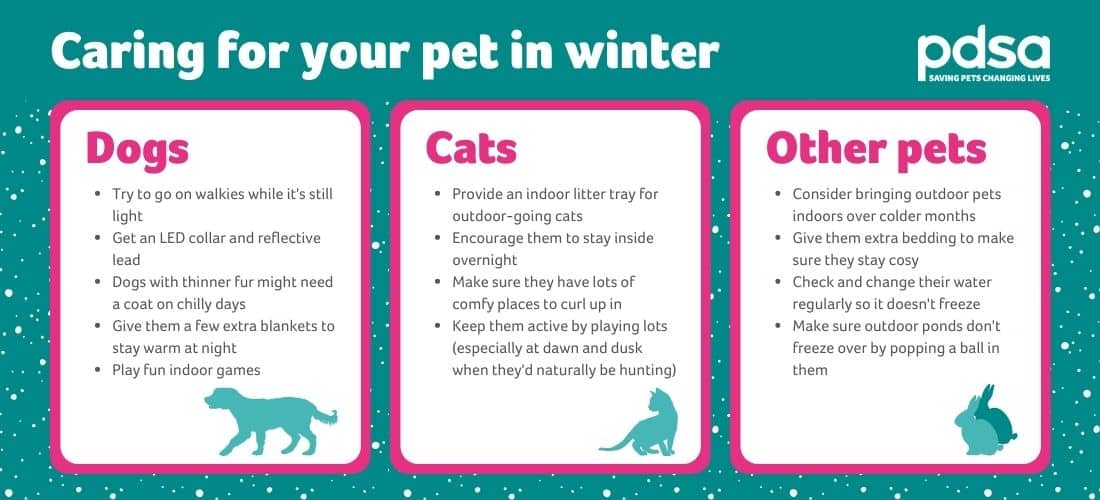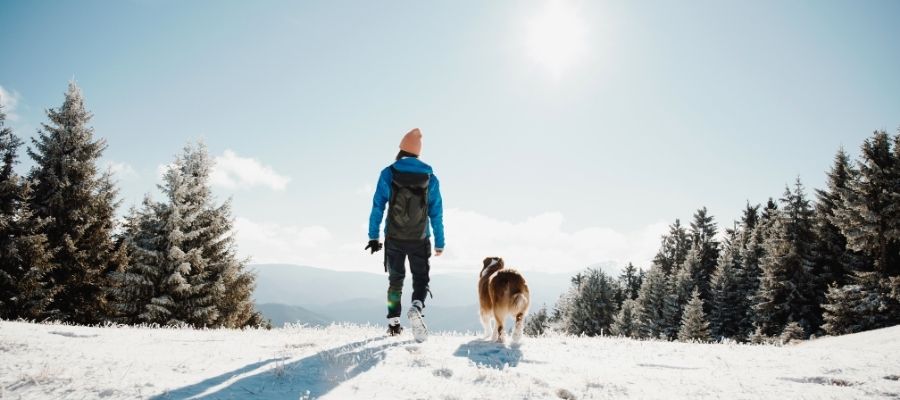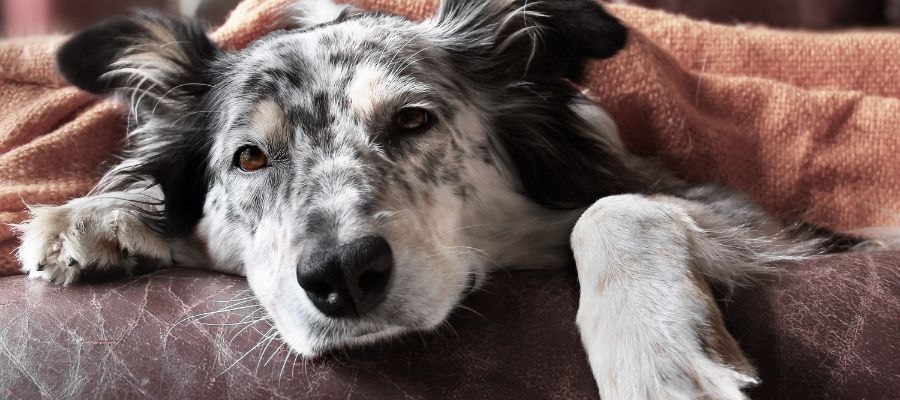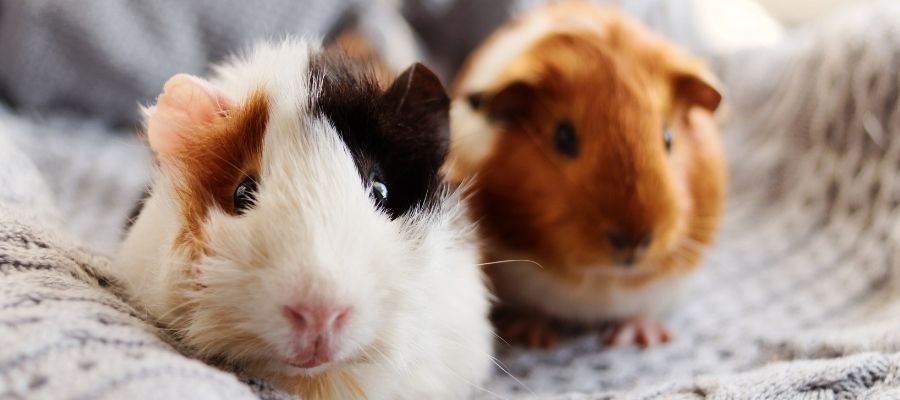As we go into the winter months the evenings are darker and the weather gets colder so it can be difficult to adapt for both us and our pets.
We’ve put together some of our top tips for taking care of your four-legged friends this winter, so you’re prepared whatever the weather.
Outdoor safety
As nice as it is to look out on a crisp frosty morning, winter comes with a fair few dangers for our four-legged friends! Take extra care and remember to watch out for some common winter hazards:
- Salt and grit. The salt and grit we use on roads in winter can irritate pet’s paws. Wash your pet’s paws if they come into contact with salt and grit and you could apply a thin layer of paw butter to your dogs’ pads to help protect them from cracking.
- Snowy paws. Snow can build up on dogs’ paws and cause them discomfort, so prepare paws by keeping hair between pads trimmed, so there’s less hair for the snow to gather on. If your dog will tolerate them, you may find boots helpful too. When you get home from your snowy walk, check in-between dogs pads for snow build up. You can soak any snow off in warm water, rather than causing more discomfort by pulling off lumps of snow.
- Storms and floods. It’s best to be prepared for bad weather over winter. Storms and floods can cause havoc and really upset our pets. Take a look at our stormy weather advice.
- Antifreeze and de-icer. These are used in car radiators and to stop cars icing up in winter but they are incredibly toxic for animals and can kill them. If you suspect your pet may have licked some antifreeze, tell your vet immediately so they can start treatment straight away, never wait for symptoms to appear. Keep antifreeze out of the reach of pets and clean up any spills really thoroughly – so no one is put at risk.
- Provide shelter. Ideally on really wintry nights we’d advise that you keep your cat indoors, but if your cat is determined to explore the great outdoors come rain or shine, make sure they have somewhere warm and sheltered they can go, if the weather takes a turn for the worse. This is especially important if you don’t have a cat flap or if your cat flap has got blocked up with snow or frozen up!
- Cars. Cats often shelter under cars in cold and wet weather, or even climb inside the bonnet to be next to a warm engine. Always check your car for visitors who may have climbed up inside, or knock on the bonnet before you start it.
- Poisonous plants. Festive favourites like holly, ivy and poinsettia are all toxic to pets if they eat them. Keep them out of your pet’s reach or use artificial plants to decorate your home.

Winter Walkies
Most cats will prefer to be inside when it’s wet outside but don’t use it as an excuse not to walk your pooch - many dogs still love the chance to explore during the colder months! There are things you can do to help them enjoy winter even more when they do venture outside.
- Daytime walks. Our dogs enjoy walks in the dark about as much as we do! It can be more difficult to see hazards and if your dog doesn’t have great eyesight anyway it can be a bit unsettling for them. Where you can, try to walk your dog during the daylight hours.
- Stay seen. If you can’t walk your dog during the light, take extra precautions to stay safe on those night time walks. LED collars, hi-vis leads and coats can be great ways to make sure both you and your pooch will be seen. A good torch is also a must-have to light the way for you both! Don’t let your dog off the lead after dark - there could be hidden hazards out there you can’t see.
- Keep warm. Usually your dog’s fur will be enough to keep them warm when they’re out and about, but sometimes dogs with thinner fur or those who are older or unwell can feel the chill a little more. Investing in a good winter coat for your dog is an ideal way to keep them warm on cold walks.
- Stay active. It’s really important you don’t let your dog become a winter couch potato! If they’re reluctant to go out in bad weather, wait until there’s a break in the weather to make sure they still get their outdoor fun. Walks might be shorter than normal outside, so enjoy a few extra play sessions inside, so that no one is missing out on vital exercise and remember that if the exercise level has dropped, so should how much you feed!
- Icy surfaces. Just like us, our dogs can slip and fall on icy surfaces. Always be extra careful on walks particularly if your dog has leg problems such as arthritis as these slips can cause serious injuries. It’s also a good idea to check your pet’s paws if they’ve been out in the snow and ice as cold temperatures, grit and salt can make pads very sore.
- Frozen ponds. Be really careful when out on walks in freezing conditions, frozen ponds and lakes are dangerous but also enticing for an excited dog, but they can easily fall through the ice and get into serious trouble in the freezing water. To keep your dog safe, keep them on a lead.

Keep them cosy indoors
Dogs and cats often enjoy the chance to snuggle down indoors when the temperature drops. There are a few things you can do to take extra care of your pets this winter:
- Make sure they’re comfy. A few extra blankets for their bed over the winter months will help your pets stay cosy and warm. You can also get raised beds for older dogs to keep them out of draughts and remember cats like high up dens so they can survey their world.
- Hypothermia. If our pets get too cold, they can be at risk of developing hypothermia. Find out what signs to look out for and how to prevent it happening.
- Litter trays. Even if your cat usually goes to the toilet outside, it’s a good idea to provide them with a couple of litter trays inside so they don’t feel like they have to go out when the weather is really bad or they can’t manage to dig themselves a little toilet hole in the frozen soil. If you have more than one cat, provide a toilet each plus one!
- Extra playtime. It’s important to keep your pets active whatever the weather. Get them some new toys and make sure you play with them regularly, especially if they go out less over winter. Cats will be most active at dawn and dusk (prime hunting time) so try to make sure you play with them then.
- Stay cosy. Your cat will really appreciate a few extra comfy spaces to curl up in around the house. Igloo beds are ideal for winter because your cat can really get cosy in them.
- Take care of older joints. Pets can start to get stiff joints and arthritis in their old age and sometimes colder weather can make this a lot worse. Make sure you take good care of your older pet’s joints, especially in the cold.
- Christmas safety. Christmas can come with its own dangers. Take a look at our Christmas survival guide.

Caring for small furries
Our small pets (such as rabbits, guinea pigs and ferrets) can really feel the cold and changes in weather. A sudden drop in temperatures can be a real shock to the system, but there are a number of things you can do to help them:
- Bring them indoors. If your pets normally live outdoors, think about bringing them indoors or into a sheltered area, such as a shed or car-free garage out of the wind and protected from rain and snow – but remember they still need daylight, so make sure they have a window.
- Keep away from draughts. If you can’t move small animals that usually live outdoors, indoors, then prepare their home by insulating the sides of their home with newspaper or carpet, cover open fronts to protect them from direct weather, but make sure there’s plenty of ventilation. Make sure really small pets, like hamsters or mice, are kept indoors, away from any cold draughts. You might need to move their enclosure to a warmer part of the house and away from windows.
- Keep them cosy. All small pets should have extra bedding over winter so make sure there’s plenty and it’s deep so they can snuggle right down.

